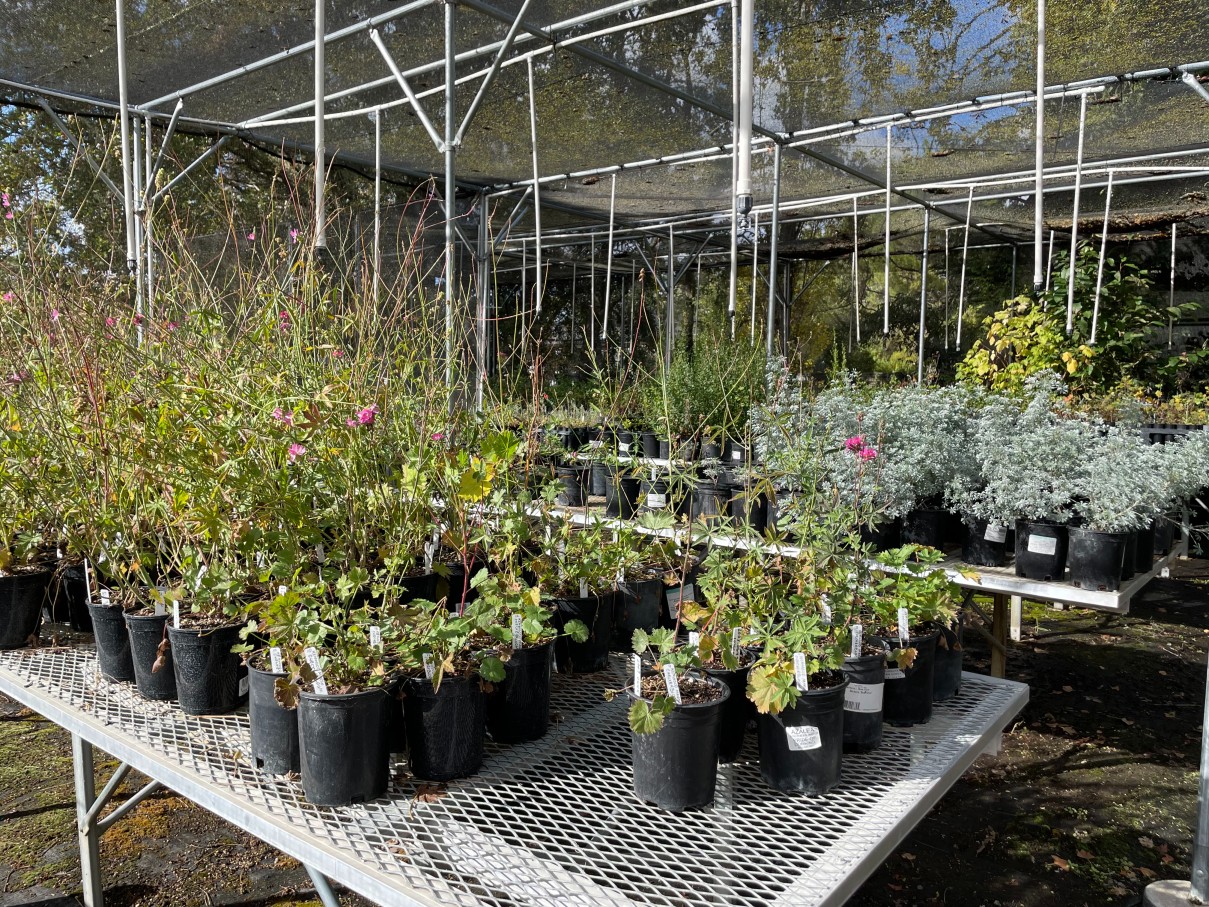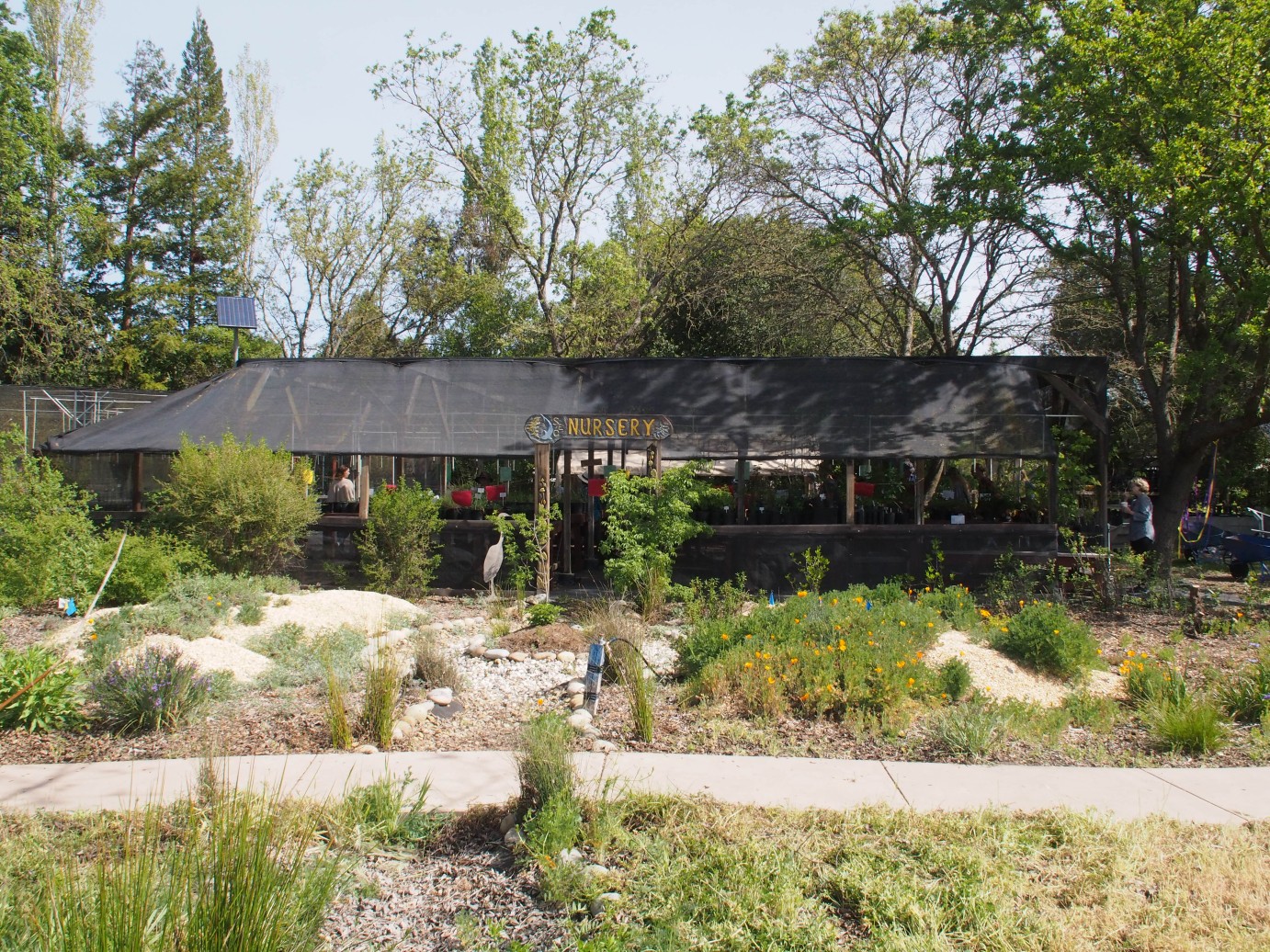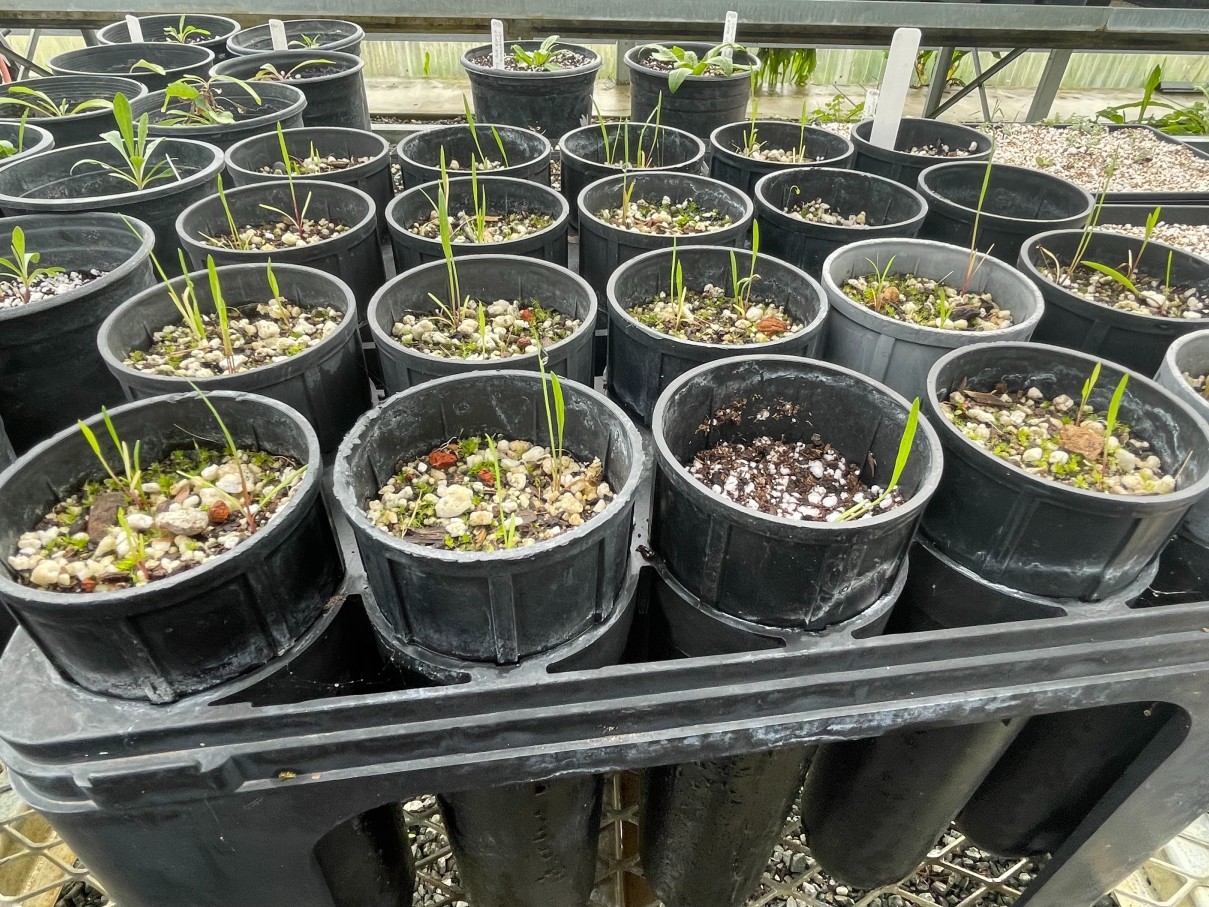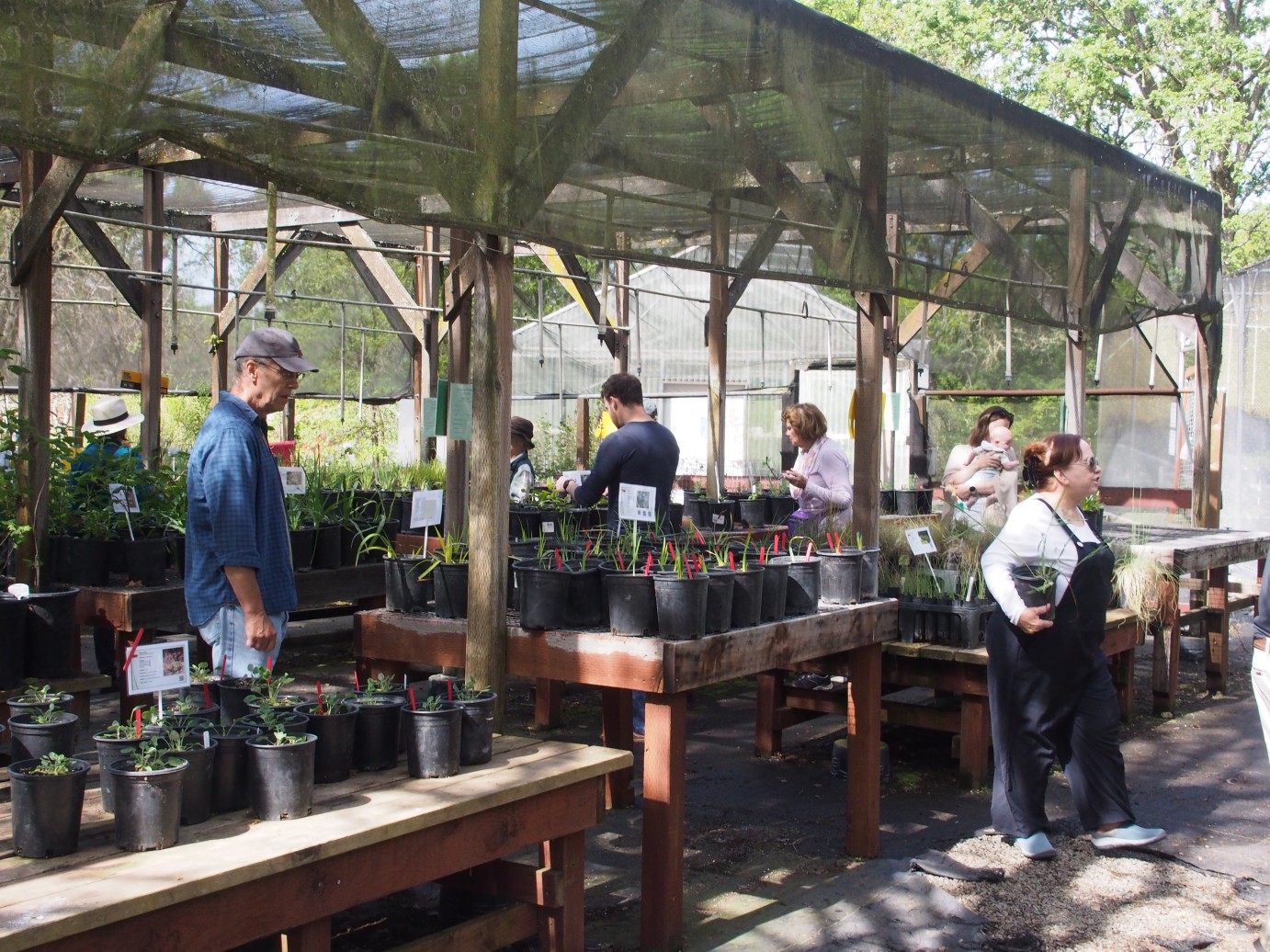Sonoma Garden Park
Sonoma Garden Park is a 6.1 acre public garden located at 19996 7th St E, Sonoma, CA, 95476 and is open daily from sunrise to sunset.
707.996.0712 ext. 130
Events
Permits are required for events over 10 persons. Email garden@sonomaecologycenter.org to request a permit for your gathering.
Ways to Volunteer at Sonoma Garden Park
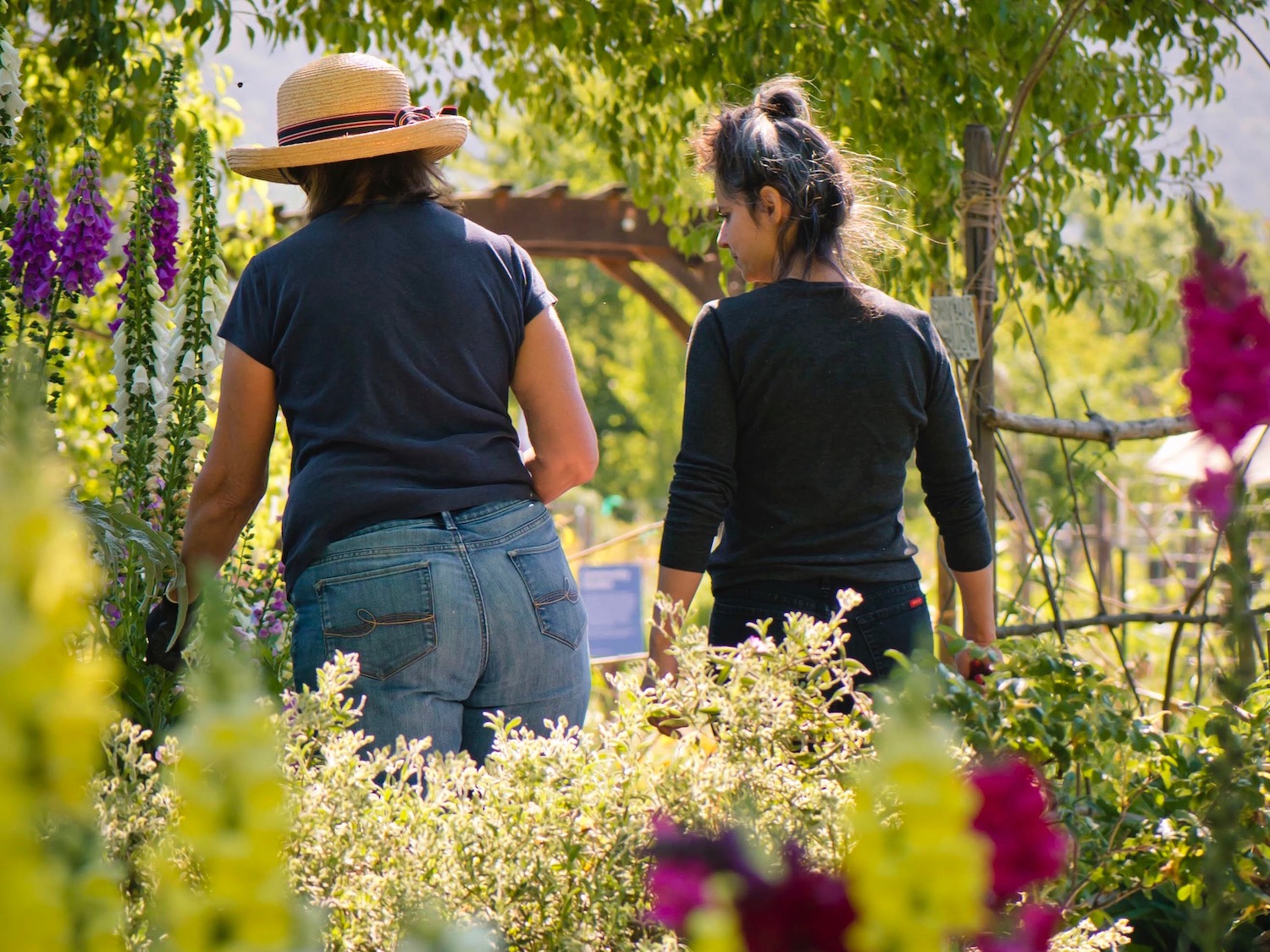
Volunteers play a vital role in building and maintaining Sonoma Garden Park. Join a community of warm and welcoming volunteers while growing your gardening knowledge!
Sonoma Garden Park Volunteer Hours
- Mondays 9:00 am-12:00 pm — General Garden Park Volunteering. Drop-in allowed.
- Wednesdays 9:00 am-12:00 pm — General Garden Park and Native Plant Nursery Volunteering. Drop-in allowed.
- Fridays 9:00 am-12:00 pm — General Garden Park and Native Plant Nursery Volunteering. Drop-in allowed.
- Every third Friday Volunteer Workday and Social 9:00 am-12:00 pm. This is a great opportunity to meet existing and new volunteers. After work, enjoy a light lunch provided by Sonoma Ecology Center.
- Saturdays 9:00 am-12:00 pm — General Garden Park Volunteering. Drop-in allowed.
If you’re planning on becoming a regular volunteer, please create an account with Better Impact below (5 minutes). For questions, please email volunteer@sonomaecologycenter.org.
Join a team!
Email volunteer@sonomaecologycenter.org to learn how you can join our various volunteer teams, like the chicken team or the harvest market team.
Set up a regular volunteer time, or bring your company!
Corporate volunteering provides a great way to boost company’s morale, brand’s reputation and trust, and creates an outlet for employees to engage with each other and the community. At Sonoma Ecology Center, we offer open drop-in hours where groups can come to volunteer at the picturesque, 6.1 acre public park, or set up a private volunteering event. Let your organization know of our volunteering opportunities and set up a corporate volunteering event by emailing volunteer@sonomaecologycenter.org.
Saturday Harvest Markets
2024 Harvest Markets reopens May 4, 2024 to the end of October, 2024. Harvest Markets take place every Saturday, 9:00 am-12:00 pm. The Harvest Market is a great place to pick up produce, flowers, and eggs harvested from our 6.1 acre sustainable garden. We also sell local honey and olive oil. The market accepts credit cards and Apple Pay. Remember to bring your reusable shopping bag!
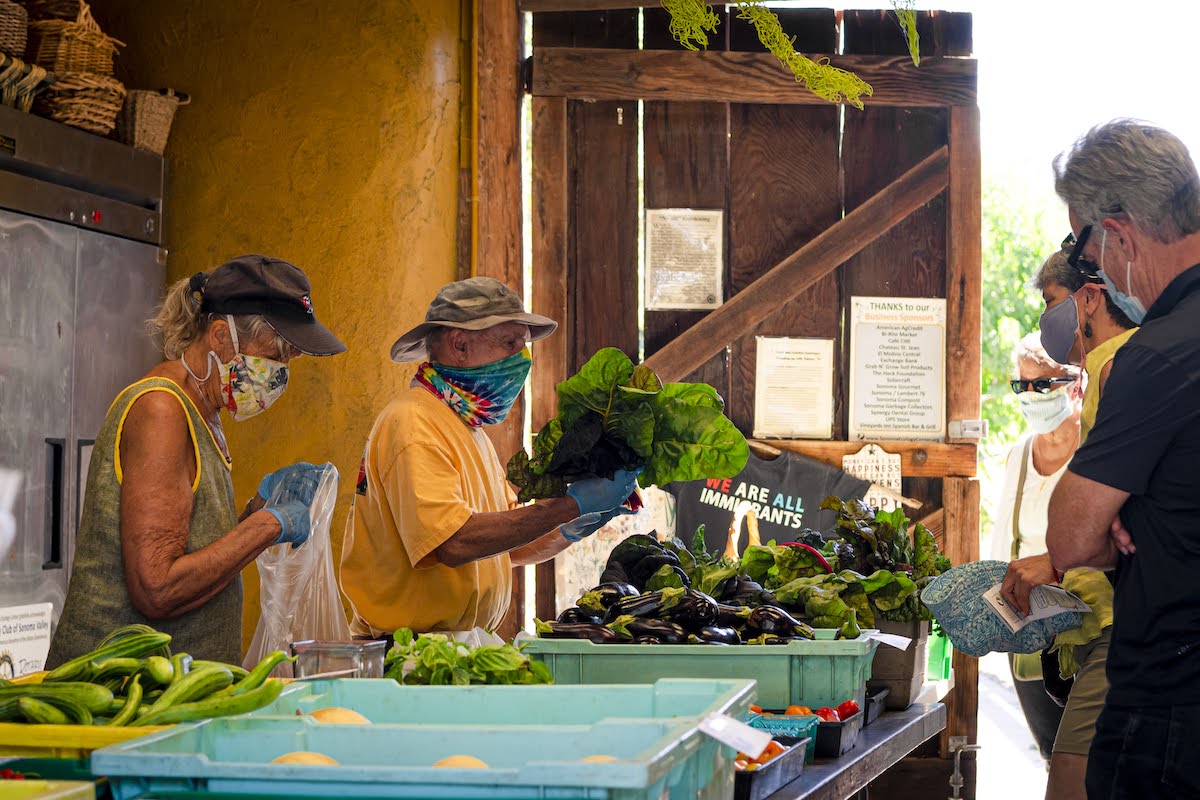
Sonoma Native Plant Nursery
Our Restoration team manages an in-house native plant nursery at Sonoma Garden Park. Through the nursery we offer more than 80 native species and are able to propagate thousands of plants every year, replanting areas in Sonoma Valley and beyond.
We contract grow for selected projects for which we conduct watershed-specific propagule collection. Our plants are grown in a variety of container stock (4” plugs, 6” plugs, tree band, D40, D60, 1 gallon, tree pots, or 5 gallon) to meet the needs of the project.
Plants are produced following Best Management Practices (BMP) protocols in clean facilities with sterilized pots and soils on metal tables under rigorous pathogen prevention standards. We conduct regular Phytophthora testing and can outsource lab work for plant materials from restoration sites or nursery stock. Our nursery is registered with the California Department of Food and Agriculture and complies with the Nursery Stock Registration and Certification Programs.
Weekly Native Plant Sale every Friday, 12:00-3:00 pm, beginning April 14, 2023: We are selling a variety of California native plants to the public every Friday from 12:00-3:00 pm to help local gardeners create and maintain drought tolerant and pollinator-friendly gardens and landscapes. Simply drop into our Native Plant Nursery. For questions, email our Native Plant Nursery Manager at hannah@sonomaecologycenter.org.
Children’s Play Area
The park’s newest feature, the Children’s Play Area features a variety of engaging and interactive play structures, including a climbing wall, slide, and swings, all made from natural materials. Through the generous donation of the Wedekind Family and the dedication of volunteer Mark Gonzalves, who donated his time and expertise to design and build the play area, the park was able to provide a much-needed play area for local children to enjoy.

Learn About Water-Wise Low-Impact Design at Sonoma Garden Park
The Sonoma Garden Park Low-Impact Design demonstrations, built in collaboration with Sonoma County UC Master Gardeners show ways that gardens can be designed to minimize water use. Try the Sonoma Garden Park’s Low-Impact Design (LID) walking tour! This self-guided tour describes the many Low Impact Design features on display around the park. Replicate these designs home for simple, beautiful, and effective drought-tolerant landscaping!
Get the Low Impact Design brochure.
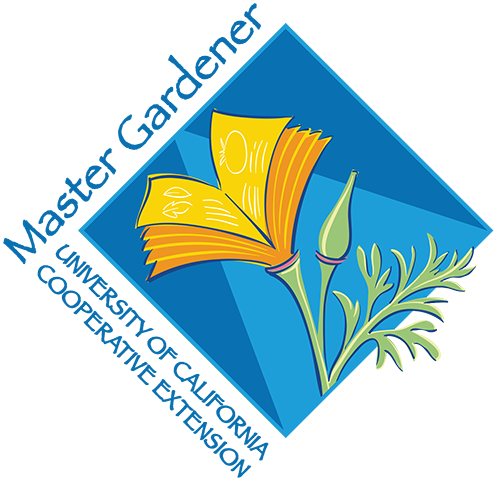
UC Master Gardener Program
The UC Master Gardeners of Sonoma County developed and maintain the Water-wise Demonstration garden at Sonoma Garden Park. These Water-wise features show how plants with low water needs could be planted within a garden setting, thus giving the garden visitors a chance to see how they might have a planted garden space without the need to water often.
The UC Master Gardeners of Sonoma County and their young gardening visitors also created the Children’s Garden, a special place where families can come to play, taste and learn about gardens. Learn more about their projects and workshops at Sonoma Garden Park.
Rent a Community Garden Plot
Email garden@sonomaecologycenter.org to check on availability.
Prices: Starting in 2025, our prices are $1.33 per square feet.
- Cost includes the use of garden tools, compost, water, and discounted registration fees for workshops to learn more about sustainable gardening.
- We rent out/renew 37 garden plots every spring.
- Spaces are rented on an annual basis.
- In addition to the annual fee, each plot holder is responsible for 20 volunteer hours at Sonoma Garden Park for the year. You may opt out of the volunteer requirements for an additional fee to support the volunteer programming at Sonoma Garden Park.
Education Programs at Sonoma Garden Park
Sonoma Garden Park is the venue of our K-6 Watershed Education Program and Fieldtrips, Enviroleader Program, and Spring and Summer Science Camps. An ideal venue to learn about the interactions between humans and the environment, Sonoma Garden Park provides offers multiple education opportunities for all ages throughout the year.
History of Sonoma Garden Park
Sonoma Garden Park was originally the property of Pauline Bond, a Sonoma schoolteacher who gave the land to the City of Sonoma in 1977 with the agreement that it remains a public park. In 1993, Sonoma Ecology Center entered into an agreement with the City of Sonoma to take over regular operation of the 6.1 acre park, and began to grow it from a bare lot to its current lush grounds of orchards, gardens and public gathering places.
Improvements were made over time, including a Straw Bale Barn built in 1994, a Native Plant Nursery built in 2012, and Low Impact Design features added in 2017. In 2019, the City of Sonoma approved our new Master Plan Update, guaranteeing that this beloved park will continue to be an essential community gathering place for many years to come.
All through the growing season, Sonoma Garden Park hosts a Harvest Market in its Straw Bale Barn every Saturday from 9 am to noon, where the garden’s abundant produce — fruits, vegetables, herbs, flowers, and eggs from our chickens — is sold. For the multitude of public workshops, classes, camps, and other events held at Sonoma Garden Park, see our events calendar.
Sonoma Garden Park has changed a great deal over the years. Here are some key milestones:
1994: The Straw Bale Barn
Bruce Maxwell, a Sonoma Ecology Center volunteer, designed and supervised the construction of the Straw Bale Barn. Using almost entirely donated materials (including the roof trusses which were provided by All Truss, a local truss maker), the barn was built over the course of numerous volunteer workdays covering different phases: foundation pouring, straw bale wall installation, roof installation, stucco application, and clay floor installation. Everything in the barn is original except the clay floor, which was replaced around 2012. The redwood doors and siding were salvaged from the Dolcini family barn, once located where Adele Harrison Middle School now stands.
2007-09: Children’s Discovery Trail
This project was funded by Whitney and Janet Evans, local philanthropists who wanted to bring some of the joy of gardens they shared with their children to the people of Sonoma. The Children’s Discovery Trail currently consists of three locations and interactive panels meant to inspire and educate children about butterflies, birds, and bees.
2012: The Native Plant Nursery
An initial shade structure at the Garden Park was designed by long-time Sonoma Ecology Center Restoration Project Manager Mark Newhouser and built out of salvaged decking with volunteer labor in 2008. Soon after that, we began work on a state-of-the-art greenhouse, built mostly by volunteers over three years and finished in 2012. The Sonoma Native Plant Nursery, which now grows most of the plants for Sonoma Ecology Center’s restoration work, was funded by numerous sources, including Sonoma Rotary, Sonoma County Agricultural Preservation and Open Space District, MGP, nursery funds, Americorps labor, Audiss Electric, Boden Plumbing, Berger Concrete, Impact 100, and the City of Sonoma.
2012: Conservation Easement
A Conservation Easement, established through Sonoma County Agricultural Preservation and Open Space District (Ag+Open Space), protects the land and provides exclusions from certain types of development on the land, in perpetuity. Land must be maintained as publicly-accessible open space for recreation, agriculture, and habitat conservation purposes. The easement established eligibility for Sonoma Garden Park to receive funding through the District’s matching grant program, and has funded two phases of infrastructure development to date. Projects in those grants included the completion of an ADA pathway network, new signs, drinking water fountains, oak woodland restoration, and a native plant nursery garden.
2015: ADA (Americans with Disabilities Act) Pathway
The City of Sonoma funded a pathway system in 2007. A more permanent set of pathways, incorporating the old pathway as a foundation, was completed with funding by Ag+Open Space district’s matching grant program. These ADA pathways mean our park is a place everyone can enjoy.
2017: Low Impact Design (LID) features and Park Upgrades
Sonoma County Water Agency funded a project to provide a demonstration of LID infrastructure. These design features manage stormwater runoff so that it stays on the land, and infiltrates and recharges groundwater. Water also filters through vegetation and gravel to remove sediment and chemical pollutants before it enters streams and other bodies of water. Managed stormwater can also be stored and utilized for landscape uses. The project is intended to inspire, so that others might adopt these practices as simple, economical features that landowners can build or easily retrofit themselves.
2023: Children’s Play Area
Sonoma Garden Park’s tagline, “It Takes a Community” is exemplified in this newest feature—in addition to the financial support of the Wedekinds family, the Children’s Play Area was made possible by volunteer Mark Gonzalves, who designs nature-based play spaces through the lens of children, and donated hundreds of hours of his time and effort to the project.
2023 And Beyond:
Today, Sonoma Garden Park shows the fruits of our labor in every sense. Beloved features at the Garden Park include the seasonal Saturday Harvest Market, Native Plant Nursery, community garden plots, community workshops, and the many longstanding youth education activities such as school field trips, EnviroLeaders and Summer Science Camps.
Sonoma Ecology Center is also working on the future of Sonoma Garden Park, and is currently working with the City of Sonoma and the community to update its Master Plan to bring improvements to the park, including the inclusion of the “Grandmother Tree” and the old homestead area, an education office and classroom, and public restrooms.
See above for a great video on our educational programs at Sonoma Garden Park — plus a visit to the Garden Park in 2016 by legendary Bay Area traveler Doug McConnell.
Sonoma Ecology Center does its work on the traditional territories of the Wappo, Coast Miwok, and Southern Pomo peoples, who have stewarded this land for generations.

